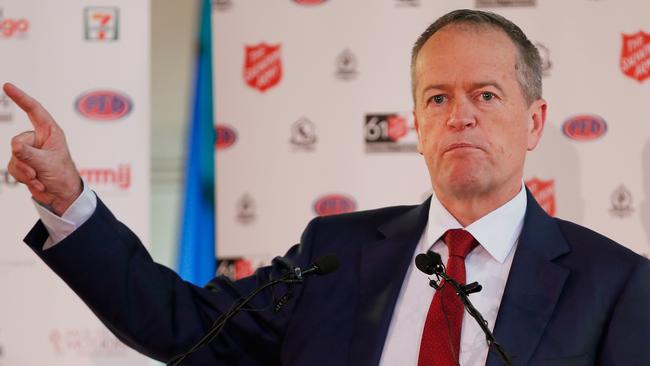Shorten ‘reckless’ on energy risk warning
Bill Shorten has been branded ‘reckless in the extreme’ for turning his back on a warning from the AEMO.

Bill Shorten has been branded “reckless in the extreme” for turning his back on a warning from the Australian Energy Market Operator that a shortage of baseload power will threaten electricity supply by 2022.
Opposition energy spokesman Mark Butler has flatly rejected the AEMO analysis in a report to government saying an extra 1000 megawatts would be needed in a “special reserve” from 2022 to fill the gap left by the scheduled closure of NSW’s Liddell coal-fired power plant. Malcolm Turnbull yesterday branded the Opposition Leader “Blackout Bill” for refusing to commit to plans extending the life of the Liddell station in the Hunter Valley for at least another five years. “Blackout Bill is completely and utterly like a rabbit caught in the spotlights. He does not know what to do,” the Prime Minister said in Samoa. “We’ve been told by AEMO that there is a shortage ... If the Liddell power station closes, as its owners say it will, then we will have a large shortage of dispatchable power.”
Mr Butler argued that the premise behind the AEMO forecast of power shortfall in 2022 was flawed and that the implementation of a clean energy target as recommended by Chief Scientist Alan Finkel would drive further investment in NSW into solar and wind power. “NSW is underdone in renewable energy,” he said. “The AEMO projection that there would be a shortfall assumes that the investment strike that we’re currently seeing in the country continues for the next five years.
“That’s why it is so important we change the frame and we actually sit down and negotiate a bipartisan clean energy target.”
Mr Butler made the comments on the ABC’s Lateline program on Thursday night, fuelling fresh claims from Energy Minister Josh Frydenberg that Labor was disregarding the best expert advice to government. “The message is clear: with Liddell scheduled to close in 2022, there will be a supply shortfall in the market,” Mr Frydenberg told The Weekend Australian. “Labor’s willingness to dismiss this expert opinion and say that the closure of Liddell is simply an issue for ‘down the track’ is reckless in the extreme.”
Mr Frydenberg and Mr Turnbull are due to meet executives from AGL, the owner of the Liddell plant, in Canberra on Monday to discuss options for keeping the plant open beyond 2022.
Mr Shorten yesterday downplayed the need for an immediate decision on the Liddell plant as a “bit of a distraction”, saying it was 50 years old and more urgent action was needed, including the development of new rules for the energy market and a swift intervention to restrict gas exports. He said the main priority for government should be addressing AEMO’s finding that about 1000MW of strategic reserves would be needed to minimise blackout risks this summer.
“It’s not much good worrying about what happens in 2022 when we’ve got this summer coming up right now,” he said. “We’ve got to deal with that.”
Mr Shorten’s stance was backed by Electrical Trades Union national secretary Allen Hicks, who said it was “not viable” to extend the Liddell plant beyond 2022. “We have five years to make the necessary investments to replace its generation capacity with clean energy. We should begin that process as soon as possible,” he said.

